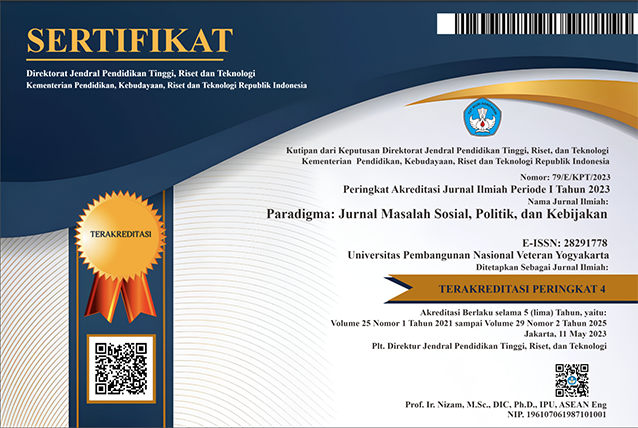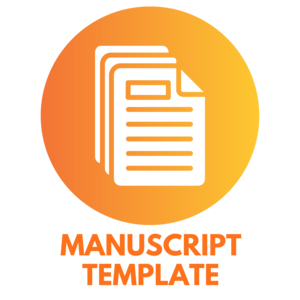PENGARUH INTELLECTUAL CAPITAL DISCLOSURE TERHADAP EMPLOYEES COMPENSATION DAN DAMPAKNYA TERHADAP FIRM PERFORMANCE
DOI:
https://doi.org/10.31315/paradigma.v27i2.10127Keywords:
intellectual capital disclosure, employee compensation, firm performance, perusahaan otomotifAbstract
Penelitian ini bertujuan untuk menguji dan menganalisis pengaruh intellectual capital disclosure terhadap employee compensation, pengaruh employee compensation terhadap firm performance, dan pengaruh intellectual capital disclosure terhadap firm performance. Penelitian dilakukan pada 11 perusahaan otomotif di Indonesia yang terdaftar di BEI. Data dikumpulkan selama 8 tahun mulai periode tahun 2011 sampai dengan tahun 2018 dari laporan tahunan perusahaan. Teknik analisis yang digunakan adalah analisis inferensial dengan pendekatan WarpPLS. Hasil penelitian menunjukkan intellectual capital disclosure berpengaruh tidak signifikan terhadap employee compensation, employee compensation berpengaruh signifikan terhadap firm performance, dan intellectual capital disclosure berpengaruh signifikan terhadap firm performance. Hasil penelitian ini menguatkan signaling theory dan agency theory yang melandasi pengaruh antar variabel penelitian. Hasil penelitian ini bermanfaat bagi manajemen dalam meningkatkan firm performance.
References
Abeysekera, Indra. 2007. Intellectual Capital Reporting Between a Developing and Developed Nation. Journal of Intellectual Capital. Vol. 8 No. 2. 329-345
Bahl, J. 2015. Impact of Employee Compensation On Firm'S Performance. The International Journal Of Business & Management, Vol. 3, Issue 2, February, 150-154.
Bozzolan, S., O’Regan, P., & Ricceri, F. 2006. Intellectual capital disclosure (ICD). Journal of Human Resource Costing & Accounting, 10(2), 92–113.
BPS, 2019. “Statistik Indonesia Dalam Infografis 2019,” Badan Pusat Statistik, 2019. [Online]. Available: https://www.bps.go.id/publication/2019/09/26/c90ef44501d430ddb065bec5/statistik-indonesia-dalam-infografis-2019.html.
Brooking, A. and Motta, E. 1996. ‘A taxonomy of intellectual capital and a methodology for auditing it’, 17th Annual National Business Conference, McMaster University, Hamilton, Canada, pp.24–26
Tandelilin, Eduardus. 2010. “Portofolio dan Investasi: Teori dan Aplikasi”. Edisi Pertama. Yogyakarta : Kanisius.
Fama, E.F. and Jensen, M.C. 1983. Separation of Ownership and Control. Journal of Law and Economics, 26, 301- 325.
Fernandes, N. 2008. Board Compensation and Firm Performance: The Role of Independent Board Members. Journal of Multinational Financial Managemen. 18 (2008) 30-44
Flamboltz, E.G., M.L. Bullen and W. Hua. 2002. Human Resource Accounting : A Historical Perspective and Future Implications Management Decision. 40 (10) : 947-954
Guthrie, J., R. Petty, F. Ferrier, dan R. Wells. 1999. There is no accounting for intellectual capital in Australia: review of annual reporting practices and the internal measurement of intangibles within Australian organisations. dipresentasikan pada International Symposium Measuring and Reporting Intellectual Capital: Experiences, Issues and Prospects, 9-11 June, di Amserdam.
Jardon, C. M., & Susana Martos, M. 2012. Intellectual capital as competitive advantage in emerging clusters in Latin America. Journal of Intellectual Capital, 13(4), 462–481.
Jensen, M. C., & Meckling, W. H. 1976. Theory of the firm: Managerial behavior, agency costs and ownership structure. Journal of financial economics, 3(4), 305-360.
Khalique, M., Bontis, N., bin Shaari, J. A. N., & Isa, A. H. B. M. 2015. Intellectual capital in small and medium enterprises in Pakistan. Journal of Intellectual Capital, 16(1) 224-238
Khan dan Jain. 2007. Management Accounting. New Delhi: Tata McGraw-Hill
Mondy, R. W.and Noe, R. M. 2010. Human Resource Management. Eleventh Edition.USA
Orens, Raf; Aerts, Walter; Lybaert, Nadine. 2009. Intellectual Capital Disclosure, Cost of Financeand Firm Value, Managenet Decision 47 (10): 1539 – 1554
Sharma, Ravi S. Teng Yu Hui, Pricilla, Tan, Meng- Wah. 2007. Value Added Knowledge Management for Financial Performance, The Case of an East Asian Conglomerate, The Journal of Information and Knowledge Management Systems 37(4) 484-501
Spence, Michael. 1973. Job Market Signaling. The Quarterly Journal of Economics, Vol. 87, No. 3. (Aug., 1973), pp. 355-374.
Stewart, T.A. 1997. Intellectual Capital: The New Wealth of Organizations. In New York: Doubleday (pp. 1-4)
Sumedrea, Silvia. 2013. Intellectual Capital and Firm Performance: A Dynamic Relationship in Crisis Time, International Economic Conference of Sibiu 2013 Post Crisis Economy: Challenges and Opportunities, IECS 2013
Suraj, O.A., & Bontis, N. 2012. Managing intellectual capital in Nigerian telecomunications companies. Journal of Intellectual Capital, 13(2), 262-282
Tabari. Naser All Yadollahzadeh, Nasrollahi, Mohammad, Emamgholipour, Milad, Mansourinia, Elham. 2013. Relationship Between Capital Cost and Market Measures of Corporate Performance Evaluation: Evidence from the Tehran Stock Exchange,International Research Journal 0f
Applied and Basic Sciences 4 (5): 1221-1230
Whiting, R. H., & Miller, J. C. 2008. Voluntary disclosure of intellectual capital in New Zealand annual reports and the “hidden value.” Journal of Human Resource Costing & Accounting, 12(1), 26–50.
Wong, M., & Gardner, C. 2005. Intellectual capital disclosure: New Zealand evidence. Conference paper presented at the AFFANZ 2005 conference: Melbourne, Australia.
Yi, An. and Davey, H. 2010. Intellectual capital disclosure in Chinese (mainland) companies, Journal of Intellectual Capital, Vol.11 No.3, pp.326-347
Yi, An., Davey, H. and Eggleton, I.R.C., 2011. Toward a Comprehensive Theoretical Framework for Voluntary IC Disclosure. Journal of Intelectual Capital. 12(4): 571-585
Downloads
Published
How to Cite
Issue
Section
License
The manuscript submitted to Paradigma: Jurnal Masalah Sosial, Politik, dan Kebijakan journals are released under the license of Creative Commons Attribution-Non Commercial- ShareAlike (CC BY SA) if and when the article is accepted for publication.
We declare that:
- This paper has not been published in the same form elsewhere.
- It will not be submitted anywhere else for publication prior to acceptance/rejection by this Journal.
- A copyright permission is obtained for materials published elsewhere and which require this permission for reproduction.
Retained Rights/Terms and Conditions
Authors retain all proprietary rights to the published works, such as (but not limited to) the following rights:
- Copyright and other proprietary rights relating to the article, such as patent rights,
- The right to use the substance of the article in own future works, including lectures and books,
- The right to reproduce the article for own purposes,
- The right to self-archive the article
The right to enter into separate, additional contractual arrangements for the non-exclusive distribution of the article's published version (e.g., post it to an institutional repository or publish it in a book), with an acknowledgment of its initial publication in this journal Paradigma: Jurnal Masalah Sosial, Politik, dan Kebijakan



